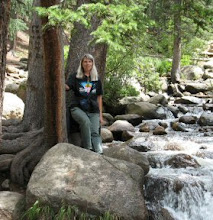Finally, Earth Day and Spring seem to be arriving simultaneously! Thirty-nine years later, it seems we don't hear enough about Earth Day, which should certainly be (along with Buy-Nothing Day, the Friday after Thanksgiving) our most significant—and transformative—holiday.
I still remember that first Earth Day, when we thought picking up garbage was a significant way to celebrate. The world, or at least this state-side portion of it, has indeed been transformed since then, so subtly we often fail to realize it. Although it seems we can never do enough, let's look at a few things that have changed for the better since 1970, signs of the times, at how full our collective glass really is.
Litter: once ubiquitous on major highways; drivers were warned of the consequences of throwing refuse out car windows. $500 fines, rarely enforceable, have been replaced by Adopt-a-Highway signs, and volunteers help keep our scenery looking more scenic and less trashed than in 1970.
Endangered species: yes, and more of them than ever, but the Bald Eagle, our national symbol, is no longer among them. Neither is the Peregrine Falcon, the American Alligator, the Gray Wolf, or the Grizzly Bear. Whooping Cranes, Desert Pupfish, California Condors, and Black-footed Ferrets have not disappeared as predicted, thanks to strenuous measures by many people. Your children don't even remember DDT or the spray trucks of summer, implicated in many of those declines.
However, 51 species have been delisted, and not all of them are charismatic megafauna. Delisting always makes me nervous; guess I'm naturally suspicious. Here's the scoop, in case you were wondering. Of those 51 species, 25 have been delisted because of recovery. Seventeen have been delisted because the "original data [were] in error." Unfortunately, the remaining nine have been delisted by reason of the fact that they've gone extinct. How many of us can name even one of them? (See Requiem, below.)
Habitat protection: although still committed to resource extraction, most land-management agencies at least acknowledge and evaluate the consequences of their actions. We have, thanks to many nongovernmental organizations as well, more protected habitat nationwide than we did in 1970, and we can't have wildlife and wild plant diversity without habitat.
Air and water quality: places where city sewage flows freely into local streams and industries spew poisons into the air unregulated are no longer a daily experience in most communities.
For all that remains to be done, we are fortunate here in the U.S. that significant progress has been made. But it is not cause to rest. For each item in the list, there is bad news somewhere, and we don't need to look far to find it.
——
Requiem (with date delisted): Guam Broadbill (2/24/04); Longjaw Cisco (9/2/83); Amistad Gambusia (12/4/87); Mariana Mallard (2/23/04); Sampson's Pearlymussel (1/9/84); Blue Pike (9/2/83); Tecopa Pupfish (1/15/82); Santa Barbara Song Sparrow (10/12/83); Dusky Seaside Sparrow (12/12/90).
The Church of Winter Trees
9 hours ago

No comments:
Post a Comment